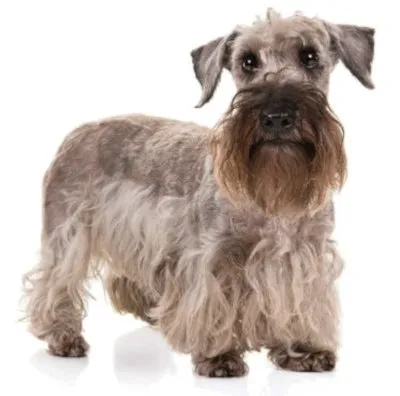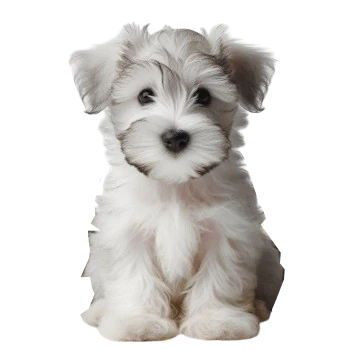
The Cesky Terrier, also known as the Czech Terrier, is a dog breed originating from the Czech Republic. This medium-sized terrier is renowned for its elegant appearance, gentle temperament, and great adaptability. Initially developed for hunting small game, it is now an excellent family companion.
The Cesky Terrier typically stands between 25 and 32 cm (10 to 13 inches) tall at the withers and weighs between 6 and 10 kg (13 to 22 pounds). It is characterized by its long, low-set body, short legs, and elongated head with a rectangular muzzle. The eyes are medium-sized, dark in color, with a lively and intelligent expression. The ears are medium-sized, drop-shaped, and form a V, giving the dog an alert yet gentle appearance.
The Cesky Terrier's coat is silky, fine, and slightly wavy. It requires regular maintenance, including weekly brushing and trimming every two to three months to maintain its characteristic shape. The most common coat colors are gray-blue (ranging from charcoal to platinum) and light gray. Puppies are often born black, with the color evolving during the first year.
The Cesky Terrier is known for its gentle, affectionate, and adaptable temperament. Less stubborn than some other terriers, it is relatively easy to train and gets along well with children and other pets. It is a vigilant dog, making it a good watchdog, but it is generally less barky than other terriers. Its sociable and affectionate nature makes it an excellent family companion.
Although small in size, the Cesky Terrier needs a good amount of daily exercise to stay fit and happy. It enjoys walks, playing fetch, and can excel in activities like agility and obedience. Due to its hunting heritage, it may also enjoy digging, so it is advisable to provide it with stimulating activities to prevent boredom.
The Cesky Terrier is generally a robust breed with an average lifespan of 12 to 15 years. However, like all breeds, it can be prone to certain health conditions, including hip dysplasia, eye problems, and Scottie Cramp, a neuromuscular disorder. A balanced diet, regular veterinary care, and moderate exercise are essential to maintaining its good health.

The Cesky Terrier puppy is a robust and elegant companion, known for its affectionate nature and intelligence. This small Czech terrier is easily recognized by its silky blue-gray coat and distinctive beard. Calm and adaptable, it’s ideal for family life while remaining active and playful. Highly trainable, it responds well to gentle and positive reinforcement. The Cesky Terrier generally gets along well with children and other pets if socialized from a young age.
The price of a Cesky Terrier puppy ranges from €1,000 to €1,500, depending on the breeder, lineage, and puppy qualities. This cost may include initial vaccination fees, identification, and a health certificate. It is recommended to seek reputable breeders to ensure the puppy’s health and well-being.
The Cesky Terrier, though less well-known than other terriers, is an intelligent and affectionate dog that requires training suited to its lively and independent temperament. This breed, originating from the Czech Republic, is both gentle and determined.
Use positive reinforcement methods, such as treats and encouragement, to motivate your Cesky Terrier. Avoid overly long or repetitive sessions, as they can quickly lose interest. Vary the exercises to keep them engaged.
Socialization is essential to prevent them from becoming too reserved or wary. Expose them to different environments, people, and animals from a young age. Finally, channel their energy through stimulating activities, such as search games or agility courses.